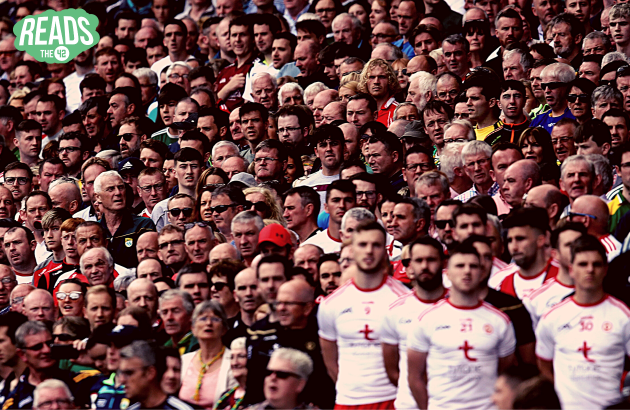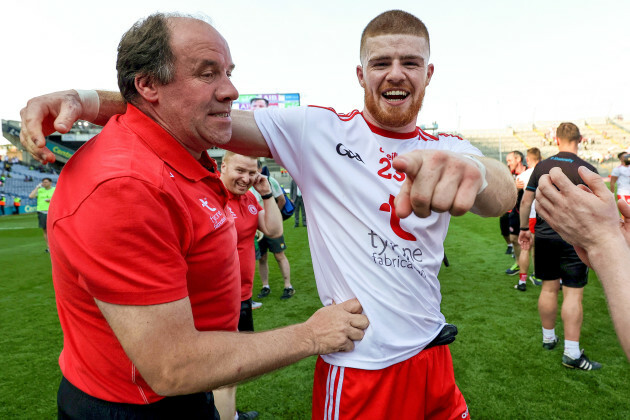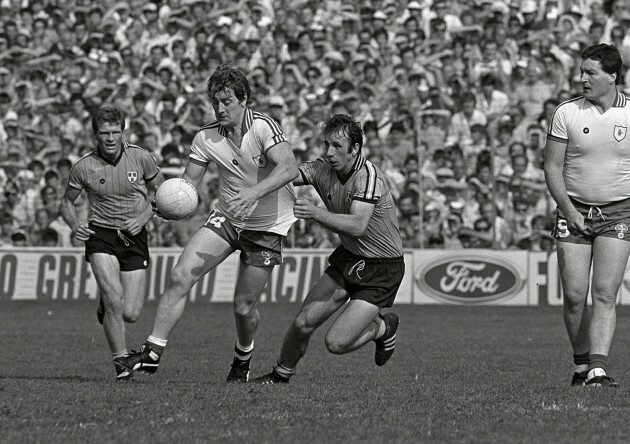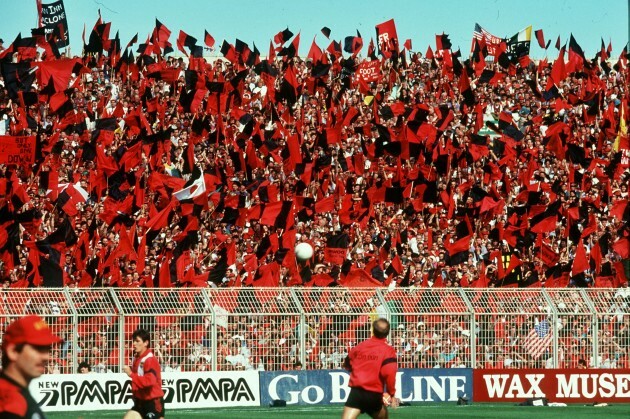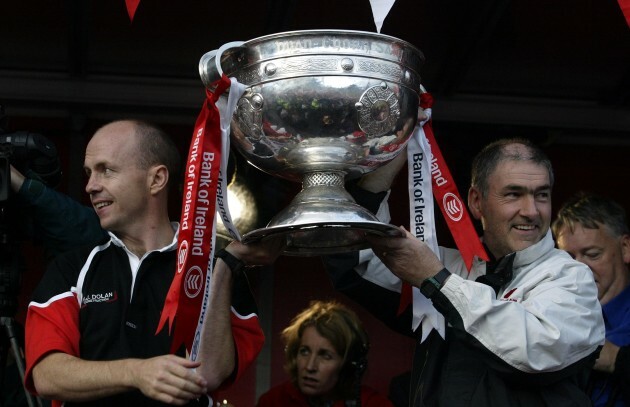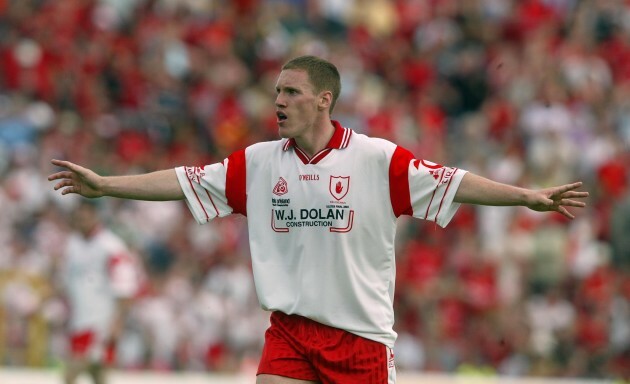AS THE THIRD goal rolled into an unguarded corner of the Kerry net, Croke Park rattled with the din. Nothing in this world may be perfect, but a summer’s day on Jones’ Road is as close as it gets.
For Tyrone, the dream survives, the adventure continues. All those hopes invested in a team, all those villagers who identify with this jersey, if you could choose one county in Ireland that feels separate to the rest, an independent state within the state; then this would be the one.
Others may argue because others have suffered similar curses. Like Tyrone, Mayo is a place hit hard by emigration, and like Tyrone, their footballers have been knocking on the Championship door for years.
But unlike Tyrone, their sporting story hasn’t been tangled up in tragic personal ones.
Think of Tyrone now and you think of an outsider within the establishment. Only three other teams, Kerry, Dublin and Mayo, have reached more All-Ireland finals this century yet when the Ulster side lined up in their semi-final two weeks ago, they were the biggest underdogs since the captain of the Titanic thought it was a good idea to go to war with an iceberg.
Still, Tyrone beat Kerry, just like they did in 2003, 2005 and 2008. You’d have thought those additions to their CV would have bought them a little more respect; you’d have imagined their consistency – last month’s All-Ireland semi-final being their 10th visit to the last four since 2003 – would have counted for something.
- For more great storytelling and analysis from our award-winning journalists, join the club at The42 Membership today. Click here to find out more>
Instead it was pitted as David versus Goliath. Except this time Goliath didn’t lose to a lucky shot from a sling but to a team who hustled and harried Kerry’s forwards like demented bullies.
The upshot is that they’re here, in their seventh All-Ireland final, chasing their fourth title. Ten counties have won more Championships but only two, Kerry and Dublin, have surpassed Tyrone’s tally of three Sam Maguires in the last 30 years.
The rest have faded away. Meath were great during the Boylan years but have been anonymous since; Galway dominated at the turn of the century but haven’t been to a final in 20 years. Armagh had their time. Now it is gone. Donegal came and went, returned to the top but are now football’s version of Luca, stuck on the second tier.
Tyrone used to be like that. They’d prosper for a while and then disappear. Now they’re different. Like it or not, like them or not, they can’t be ignored. The most recent first-time winners of the All-Ireland SFC are now in a fifth All-Ireland final of this young century. Johnny-Come-Latelys? Not this crowd. Not anymore.
DESTROYING THE ANCIEN REGIME
Francis Martin of Carrickmore, Tyrone, is 76 years old, and loves Gaelic football with a grand and uncomplicated passion.
Of course, he has never lost his perspective; any one who lived through the traumas of the Troubles could scarcely see sport as anything more than a wonderful diversion.
The year he was born, 1945, was seismic in worldwide terms but not terribly significant in Ulster football’s narrow landscape. That summer Cavan won their seventh provincial championship in a row, their 14th in 15 years. As for Tyrone, well who cared? They, along with Down, Armagh, Derry and Donegal had yet to break their duck in the Ulster SFC. Nothing seemed likely to change.
Then something did. By the time Martin was celebrating his second birthday, the 1947 Education Act was opening up free secondary education to children from working class areas in Northern Ireland. As a result, Catholic secondary schools doubled up as finishing schools for budding Gaelic footballers.
“Cavan had dominated for so long partly because Cavan had two grammar schools; places where players could hone their skills and be coached at a high level,” says Martin, a former Tyrone player and underage coach. “Suddenly, post ’47, that opportunity was prevalent throughout Ulster. Results began to be less predictable.”
They certainly did. By the time Tyrone won their first provincial title in 1956, Cavan, Monaghan and Antrim had 53 Ulster championships between them. They’ve won just 10 since, Down the first to make a sustained breakthrough, the rest coming after. Sure enough it was a highly regarded Down coach, Gerry Browne, who settled in Tyrone and became a coaching evangelist there.
They were on their way. A large, rural county – home to over 50 clubs – success was sporadic.
They won a couple of All-Ireland minor titles in the ‘40s, had a golden year in 1973 when their minors won a third All-Ireland and their captain, Frank McGuigan, helped the county’s Under 21 and senior sides to Ulster titles that same summer. McGuigan would do something special again in 1984. But by then, something a lot more significant than free education was holding Ulster football back.
THE TROUBLES
If you wonder why people from Tyrone, or indeed any of the nine Ulster counties, feel a little bit different to the rest of the country, then perhaps it is best to start with a poll carried out in the Republic in April 1969, just prior to the outbreak of the Troubles.
Under one per cent of those surveyed considered the blatant sectarianism suffered by Catholics in Northern Ireland to be a national problem.
That same summer, Margaret Tynan, a Fine Gael Mayor of Kilkenny, publicly asked: “Do we want the North?”
By 1974, Maurice Hayes, a prominent Northern Ireland civil servant and the administrative genius behind Down’s sudden rise to prominence in the 1960s, was answering her question. “The general public attitude in Dublin to the Northern Ireland situation ranges from apathy to ambivalence,” Hayes said. “Most people are fed up with the Northern Ireland issue.”
It is easy to understand why. The Troubles brought bombs and death to Dublin’s doorstep, nearly 100 people from the Republic dying as a result of the conflict. Bank robberies, to fund paramilitary activities, were widespread in the 1970s, tension evident as a result of the influx of refugees.
By 1971, there were 26,183 people residing in the Republic of Ireland who had been born in Northern Ireland. Within a decade, that number had grown to 40,557. “Northern people wrecked every place they went to,” a Mayo TD said in 1972. His was not a solitary voice. Mícheál MacGréil’s study of popular attitudes in Dublin, carried out in 1972 and 1973, found that 56.2 per cent of those surveyed said that “northerners on all sides tend to be extreme and unreasonable”.
By the end of the decade, the disconnect between north and south had been complete, to the extent that the veteran broadcaster and journalist Vincent Browne could confidently write that “the divide between the Catholic community in Ulster and the rest of Ireland is deeper now than ever”.
Amid all this, football just about carried on. The ‘70s was the province’s darkest decade politically, and the turmoil on the streets were reflected by a dip in playing standards as Ulster’s champions won just two All-Ireland SFC semi-finals between 1969 and 1990, shipping some harrowing defeats, Monaghan losing by 22 points to Kerry in 1979, Derry by 13 points in 1970 and 16 in 1976.
“It (the Troubles) had a huge effect on the GAA,” says Francis Martin, who had to play football in Donegal under an assumed name for a period in the early ‘80s when Tyrone’s club scene practically came to a standstill during the Hunger Strikes. “Among the association’s membership, there were deep divisions.”
They healed over time, not just in Tyrone but throughout Ulster. It’s hardly a coincidence that Down’s fourth All-Ireland in 1991 arrived 23 years after their third or, more pertinently, 22 years after the Troubles began. September ’91 was a period of relative stability, three years before the IRA ceasefire was announced.
The most remarkable element to that victory, though, was its aftermath. Across the province, rival counties rushed to extend their congratulations, the tribal hatred disappearing as soon as an Ulster champion faced off against representatives from the three southerly provinces.
Down’s All-Ireland in ’91 was followed by Donegal’s in ’92, Derry’s a year later, Down winning again the year after that. By 1995, Tyrone had reached its second All-Ireland final. It’d be another eight years before they’d get to their third but unlike 1986 and 1995, this would end differently.
PETER THE GREAT
The year was 1988. Peter Canavan, believe it or not, was ineligible to play for Tyrone because the parish he was from was embroiled in a row that is too complicated to get into right now. Anyway, the upshot was that for the bulk of his teenage years, the greatest player Tyrone ever had was unable to represent his county.
Francis Martin knew all about his potential, though, and after taking over the Tyrone minor team, he came up with the cunning plan to persuade Canavan to join Killyclougher Hurling Club, thus allowing him to pull on a white jersey with a red hand on it.
If only things were that simple. Instead, when Tyrone played Down in an Ulster minor quarter final, there was a stand-off. “You can’t play him,” Martin was told by a county board official. “I can and I will,” Martin replied.
Canavan played; Tyrone won. The county board official, after initially stalling until half-time, signed the team sheet. By then, everyone could see that Canavan was special.
Soon all of Ireland would. Look at Tyrone now and it’s easy to be fooled into thinking they were always this producer of great players and teams. The truth is they weren’t. Up until 1988, the year of Martin and Canavan’s agreement, they’d won three All-Ireland minor titles, four Ulster senior championships and little else of significance.
Since then, they’ve won another 13 All-Irelands at senior, Under 21 and minor level. Canavan was involved in four of those wins, Mickey Harte – a fellow club man of his – in eight.
The planets aligned. The greatest player the county has known overlapped with Tyrone’s greatest coach. But behind the scenes there were other quiet geniuses, the fundraisers at Club Tyrone, who financed the creation of a centre of excellence and had the vision to send paid coaches into schools long before it was fashionable.
“We’re just a wee bit ahead of the rest in that regard,” says Martin of the county’s structure. “We’re lucky to have had consistency and quality in our county board; visionary and dedicated people who had a belief that players had to come first. We’ve been able to hold onto players a wee bit better than some others because they’re seen as special. They’re treated well.”
TRIUMPH AND TRAGEDY
In the history of this Tyrone team, a sense of destiny has always been there. Their first All-Ireland was a mission to erase a century of hurt, their second to celebrate the memory of Cormac McAnallen.
By 2008, their players were yet again digging deep into their souls to renew their faith, born again on a dank August day when Dublin were crushed. Within a month a prodigal son, Stephen O’Neill, would return to the flock and they’d beat Kerry for a third time in six seasons.
The day before that 2008 final, John Devine, their goalkeeper, lost his father and when Harte was asked that year about the team’s losses, he recalled the first of those, when Paul McGirr, a Tyrone minor in 1997, was killed following a fatal collision during a game. “Even from extreme adversity you can always find something of value,” Harte said. ”When Paul died, the young players around him had to grow up pretty fast, had to learn that there is a family behind every player, a family who have experienced hurt and loss. And so they became more aware of the feelings of other people. That was a good thing. On the field they then turned that adversity into a positive, not by a crusade but by doing the best they could as individuals.”
So, come 2006, when they faced sporting problems, Canavan’s retirement, and the arrival of an injury plight which robbed them of O’Neill, Brian Dooher and Brian McGuigan, they dug in. “Mickey’s great secret is his humility,” said Enda McGinley in 2011. “He was not one of these guys who thought he had the whole thing cracked. He listened and evolved.” Ryan McMenamin added: “Time after time he reminded us we were never beaten. That was the sort of fighting talk we liked to hear.”
Colm O’Rourke said they were finished in 2007. Those words looked fairly stupid a year later, not as foolish though as Pat Spillane’s snobbish dismissal of their tactics. “I criticised them in 2003, and said they were guilty of playing, ‘Puke football’ and all that,” Spillane told me in 2019. “The reality is that what they were doing was spot on because they were the first ever team from Ulster to come to Croke Park and say, ‘We’re not going to stand back and admire these boys. We’re going to get into them’.”
Eighteen years on, they’re back in Croker, yet again seeking to ‘get into’ a team dressed in green. Practically everyone else in the country want Mayo to win, given the pain they’ve endured. There’s no point telling Tyrone that, though. They don’t really care what others think.
DECLINE? WHAT DECLINE?
Mickey Harte’s problem was doing too good a job too quickly. Winner of an All-Ireland, Ulster championship and National League in his first season and All-Ireland champion again in 2005 and 2008, he changed Tyrone’s perception.
Until he arrived, they were regarded as flaky underachievers but by 2008, they were issuing eviction notices to the game’s aristocrats.
Galway and Meath, ranked third and joint-fourth on Gaelic football’s roll of honour, contested the 2001 All-Ireland, Galway’s third final in four years, Meath’s seventh in 14. In the years since, Harte took Tyrone to nine All-Ireland semi-finals, a stage Meath have reached just twice and Galway once in the same timeframe. Armagh, semi-finalists in five years out of seven between 1999 and 2005, have not travelled beyond the quarter-finals in 16 years. Cork have not done so in nine.
Tyrone’s consistency should be part of Harte’s legacy especially when you think that it is not that long since they were day-trippers to football’s big occasions.
Now they are long-term residents.
For more great storytelling and analysis from our award-winning journalists, join the club at The42 Membership today. Click here to find out more>
